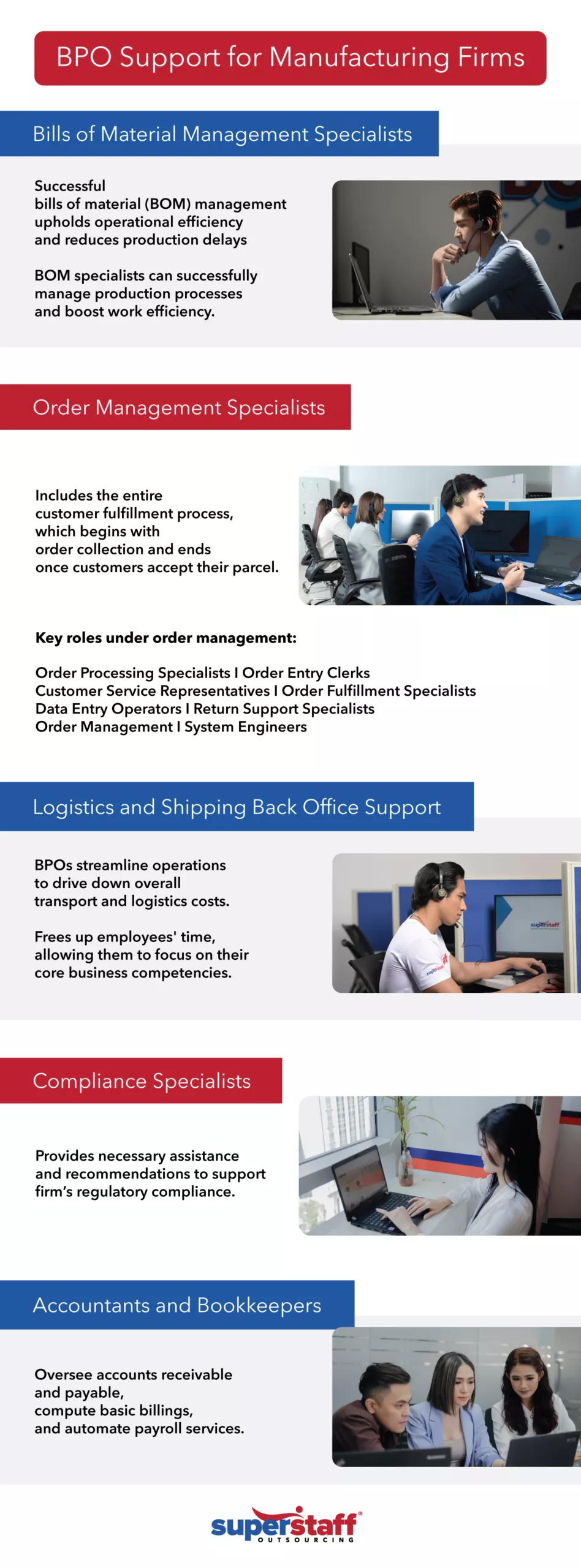
As trade takes a dive in the face of economic turmoil, manufacturers should know that there is optimism. The annual growth rate of the manufacturing market is valued at 3.57%. With the right mix of business process outsourcing (BPO) manufacturing services, the industry can leverage the projected market growth to gain momentum, secure long-term profitability, and drive productivity.
Let’s look at how the recession is taking a toll on businesses across the U.S. and Euro area and how BPO manufacturing solutions can help firms ride the tide.
Global Economic Decline Affecting Manufacturing in the U.S. and Eurozone
Demands and production in the manufacturing sector in the U.S. and across the eurozone dwindled further in June 2023. In the Euro area, Austria, Germany, and Italy recorded the weakest manufacturing performances due to the drop in new orders and production, as well as backlog congestion.
The latest business insights revealed that several factors, including higher interest rates, inflation crisis, geopolitical unrest, and worsening factory conditions, may have contributed to this decline and fueled supply chain issues.
Let’s dive deeper into how the manufacturing industries in the U.S. and Euro are faring.
The U.S. Manufacturing Sector
- In June 2023, the U.S. Manufacturing ISM Purchasing Managers Index (PMI) hit a six-month low of 46.0, dropping further from May’s 46.9.
- The manufacturing sector employment was slashed by around 2,000 in May 2023.
- To combat inflation, the Federal Reserve hiked interest rates by 5%, raising the prices of manufactured goods.
- Supply chain disruptions were cited as the primary challenge by 78.3% of manufacturers.
- Other obstacles faced by producers include quality workforce retention (76.1%), rising costs of raw materials (76.1%), and expensive transportation and logistics fees (65.9%).
- In 2022, the respondents weren’t as optimistic and confident about their manufacturing business, sinking the Manufacturing Outlook Index from 59.2 in Q1 to 55 in Q2.
The Eurozone Manufacturing Sector
- The Eurozone Manufacturing PMI registered at 43.4 in June, showing a continuous decline since January 2023.
- Industrial production decreased by 4.1% in March 2023.
- The total workforce dropped from around 32.16 million in 2020 to 31.90 million in 2021.
- Germany, Europe’s economic powerhouse, fell into recession after its economic output dropped 0.3% in the first three months of 2023.
- Consumer prices in 20 EU countries were 6.1% higher in 2023 than in 2022.
- The European Chips Act will provide 6.2 billion euros of funds to protect supply chains, avoid scarcity of semiconductors, and encourage more investments.
Sources: CNN Business | CNBC I CEDEFOP | eurostat | Trading Economics | Industry Week | National Association of Manufacturers | Statista | Y Charts |
Manufacturing BPO Solutions To Boost Business Resilience

Looking ahead, the manufacturing sector in the U.S. expects a rise in GDP. At the same time, the eurozone is hinting at a modest economic rebound and deceleration of import costs.
These are positive indicators that supply chain companies will see a lucrative future. However, manufacturing leaders can accelerate their business activities even further by employing manufacturing BPO outsourcing services from the Philippines and Colombia.
What are the key manufacturing BPO solutions that can help companies navigate the economic downturn? Let’s find out.
Bills of Material Management
Complicated business operations can cost companies a fortune. In fact, when one employee works inefficiently on a task for two hours each day, a company can stand to lose about $13,345 a year. Multiply that by a hundred personnel, the loss accumulates to over $1.3 million.
Keep in mind that your goal is to invest in operations offering higher returns. So, as much as possible, business owners should veer away from inefficient processes. Otherwise, they will inevitably waste money on poor business systems.
This highlights the need for an effective bills of material (BOM) management to retain operational efficiency and avoid production delays. Here are some functions of BOM before a production run:
- Prepare a detailed breakdown of raw materials and resources.
- Sketch out the product’s structure, together with its quantity and necessary components for its assembly.
- Ensure all essential parts of the product are available in-house.
When a production line relies on a single BOM, it will produce uniform end products. As a result, businesses can satisfy client expectations and adhere to safety or other procedures. On top of that, the details in the BOM can help manufacturers identify discrepancies in multiple areas and fix them accordingly.
How can companies implement viable BOM management in their production flow? By nearshoring or offshoring manufacturing BPO services.
BOM specialists can successfully manage your production process and boost work efficiencies. Consequently, your in-house team will enhance productivity, allowing more time to work on core tasks that drive revenue.
Order Management
Since today’s customers have high expectations of receiving prompt and accurate delivery of their orders, delivery mistakes and delays may cost your consumer’s loyalty and retention. Sadly, 74% of companies have experienced late shipments since the wake of the pandemic.
To avoid these problems, there needs to be an efficient order management process in place.
Order management processing includes the entire customer fulfillment process, which begins with order collection and ends once customers accept their parcel. Generally, the order management process involves three major steps:
- Placement: A customer purchases from a website or through an automated system. Then, the sales team verifies the order and other related information.
- Fulfillment: An employee picks up the ordered items from the warehouse and packs them before shipment. Prior to that, they validate shipping details and create an invoice.
- Inventory Management: The objective of this step is to ensure that the right products are delivered to the right consignee at the right time. So, it monitors the movement of inventories, from manufacturers to warehouses, and finally, to a point of sale.
Handling orders requires the capable hands of various experts to streamline its operational workflow. Let’s take a look at the key roles under order management:
- Order Processing Specialists: Ensure the fulfillment of consumer purchases by processing them according to company guidelines.
- Order Entry Clerks: Input relevant customer data into the company server upon obtaining orders.
- Customer Service Representatives: Offer technical assistance and step-by-step solutions to customer complaints or orders via voice and non-voice interaction.
- Order Fulfillment Specialists: Responsible for recording and confirming shipping details. Then, they prepare, assemble, and pack the orders for incoming delivery.
- Data Entry Operators: Safekeep records and organize them in digital databases. Also, they screen for inaccuracies and inconsistencies in documents for further verification.
- Return Support Specialists: When items are returned, they either process refunds or replace the faulty items with new and functional ones — depending on what the customer opts for.
- Order Management System Engineers: Develop software to optimize order processes and automate repetitive activities.
The rise of e-commerce has led to a surge in demand. As such, consumers’ behavior has shifted drastically, with most expecting lightning-speed delivery – and businesses must strive to fulfill customer expectations.
To keep pace with the times, manufacturers should take advantage of modern tech that allows businesses to track the progress of their order in real-time, notifying users anywhere and at any time.
Firms can enjoy this seamless customer experience by outsourcing to a team of order management experts from the Philippines and Colombia. Your outsourced team ensures that the customer fulfillment process runs seamlessly and swiftly using modern and up-to-date practices. They also integrate scalable business models – like enterprise resource planning systems (ERPs) – to prepare for unforeseen events like supply chain delays or resource shortages.
Logistics and Shipping
The U.S. reigns as one of the leading logistics and shipping markets in the world, with a market size of $43.17 billion in 2021. The industry seeks to link manufacturers and customers through diverse modes of shipment, such as air and express services, maritime transportation, and truck delivery, to name a few. It is involved in transporting purchased goods either from a supplier to a warehouse, or first-mile delivery to customers or their representatives.
However, the sector is currently facing challenges that hinder its progress. For one thing, the Russian-Ukraine War is driving up logistics costs. Worse, 61% of industry leaders cite labor shortages and skills gaps as major problems. Over half of logistics managers believe that the supply chain may not return to normal until 2024 or after.
How can companies successfully navigate through these global pressures? By outsourcing logistics and shipping experts from the Philippines and Colombia.
Logistics works are mostly labor-intensive and keeping everything in-house can lead to employee burnout. Recruiting more local talent is also not an option due to the rising cost of wages.
By outsourcing logistics functions to a BPO, manufacturing companies can fill the talent gap at a cost-competitive rate. Leveraging their expertise, BPOs can also streamline your operations to drive down overall transport and logistics costs. Most importantly, it will free up your employees’ time, allowing them to focus on their core business competencies.
Compliance Requirements
Government leaders worldwide are adopting new measures and initiatives to alleviate the ripple effects of supply chain disruption. This means more documents need to be filed, more standard operating procedures need to be met, and more labor practices need to be improved.
Unfortunately, many companies see this as a massive challenge. Due to the demanding regulatory requirements, 45% of firms did not oversee their compliance expenditures, putting them in a financial dilemma.
A great strategy to stay on top of compliance requirements is to invest in a skilled workforce – one of the top manufacturing BPO trends in 2023.
Compliance outsourcing will help them achieve just that. Service providers from the Philippines and Colombia are knowledgeable in updated regulations in the manufacturing industry, which means they can provide necessary insights and recommendations to support your firm’s regulatory compliance.
Another advantage of outsourcing is that it will allow you to scale your compliance roles up and down depending on your needs.
Accounting and Bookkeeping
Indeed, finance is the lifeblood of any business regardless of size. But without a strong foundation in financial management, even the healthiest bottom line is bound to dry up.
This is why manufacturing companies should always maintain a quality accounting and bookkeeping department to assess their financial health and organize their cash flow. Accountants can trace the ins and outs of your inventory and budget which is necessary for future growth.
Here are other steps accountants take when computing financial statements:
- Inventory Valuation: A company is often allocated a specific budget. During the reporting period, accountants will then calculate the value of unsold inventory.
- Cost of goods sold: The total costs of manufacturing a product, which customers have purchased, are computed. They include labor, raw materials, and overhead costs.
Bookkeepers also record and store your financial ledger so you can evaluate your finances before finalizing any decisions.
Without these functions, your firm will struggle to stay afloat. Or worse, they may miscalculate their tax returns and fail to prepare them on time.
The Internal Revenue Service (IRS) levies a hefty penalty every time companies miss the deadline for filing their tax returns. On top of that, they’ll also impose interest rates. In extreme cases, the government may seize your assets until you pay your taxes in full, with penalties and interests included.
To establish financial resilience, you should consider hiring accounting and bookkeeping solutions from reliable third parties in the Philippines and Colombia.
The Philippines and Colombia are hubs for certified public accountants (CPAs) and excellent bookkeepers. Accounting and bookkeeping experts from these top outsourcing destinations don’t just stop at managing your inventory, they also oversee your accounts receivable and payable, compute basic billings, and automate payroll services.
With the right partner at your side, there’s no need to sweat about the IRS hounding you during tax season. Your outsourced team will help you file taxes so that you won’t ever skip crucial deadlines in the future.
Collaborating With BPO Manufacturing Companies in the Philippines and Colombia
Manufacturing enterprises play a massive role in the business world. As a business owner, you should always strive to protect your office operations and steer clear of supply chain disruptions. To assist you in this endeavor, you can work with BPO for manufacturing companies from the Philippines and Colombia.
Delegating some tasks to a third-party provider can seem like a daunting experience, but the professionals at SuperStaff will be there to guide you every step of the way. Our BPO company offers a wide range of solutions to help you meet your specific business goals and then take them to the next level. Your success is always our main priority.
Contact us now so we can help you discover what BPO solution aligns with your manufacturing needs.






